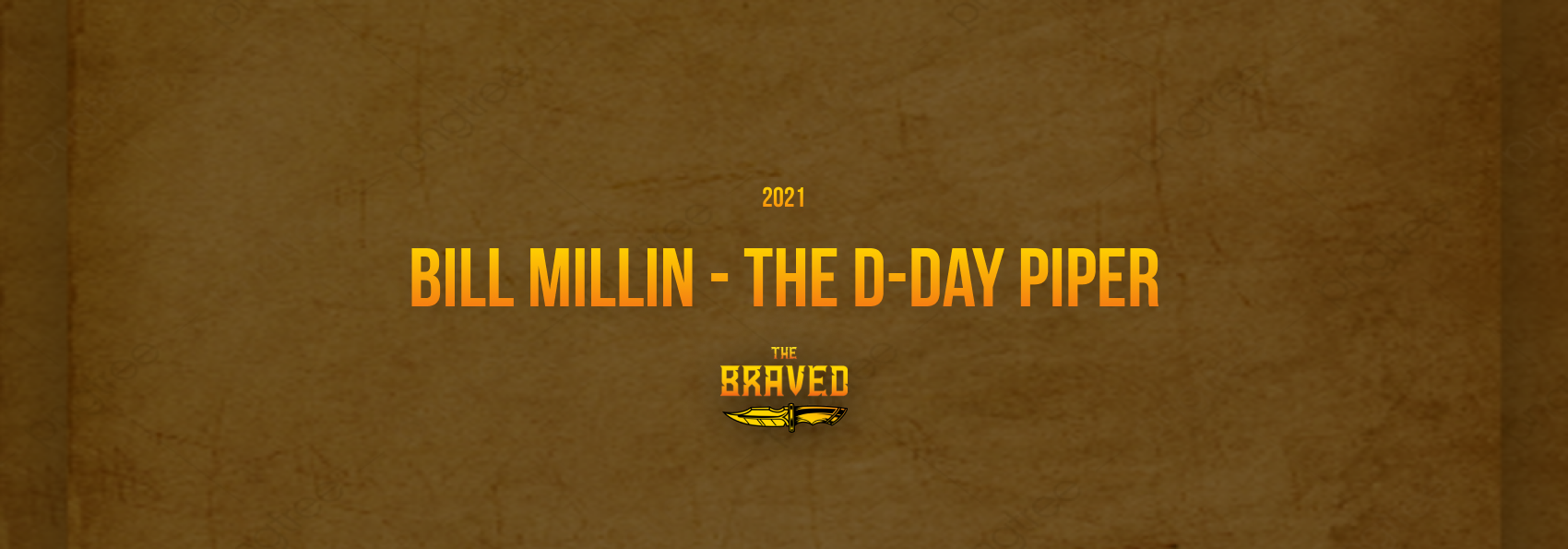There’s nothing more badass than bagpipes. Period. And bagpipes were exactly what one man wore into battle on the bloody beaches of Normandy in the Second World War.
Pre-World War II Bill Millin
William Millin came into the world on the 14th of July 1922 in Saskatchewan, Canada. His family were Scottish and returned to Scotland when Millin was still a toddler. When he was old enough, Millin joined the Army Reserve, operating out of Fort William. He played in the bands of the Highland Light Infantry and the Queen’s Own Cameron Highlanders. That was great, but Millin wanted to step up his military training too.
Evidently quite a capable warrior, he volunteered as a commando and trained at Achnacarry in Highland, Scotland. Among the other commandos at Achnacarry was a man named Simon Fraser, the 15th Lord Lovat of Scotland. Being a lord, Lovat, of course, needed a personal piper. Millin became that piper.

Lord Lovat loved Millin’s piping so much, however, that he wanted Millin beside him on the front line. For Lovat, slaying Germans wouldn’t be half as enjoyable without fat beats. The only hiccup was that the War Office had banned front-line pipers, believing they would attract sniper fire. But Lovat was a lord, and he would do things his way. When Millin expressed his concern about the War Office’s rule, Lovat said, “Ah, but that’s the English War Office. You and I are both Scottish, and that doesn’t apply.” Basically, to hell the War Office, Millin was going to do it anyway.
You see, Lovat was more than a little aroused by the upcoming Allied landings at Normandy.
As Millin later recalled, “Lord Lovat said this was going to be the greatest invasion in the history of warfare, and he wanted the bagpipes leading it.”
Bill Millin storms Normandy
Donning a kilt, Millin, a man of 21, followed Lord Lovat onto Sword Beach on the 6th of June 1944. Lovat had requested three songs: Highland Laddie, The Road to the Isles, and All The Blue Bonnets Are Over The Border. Millin played—and played good. The German snipers could see him, but they didn’t want to shoot him. Later, when some German POWs were asked about Millin, they said they didn’t blast him because they thought he was a lunatic. According to Millin, “I didn’t notice I was being shot at. When you’re young, you do things you wouldn’t dream of doing when you’re older.”
Over the gunfire and exploding mortar shells, Millin played tune after tune, and most of his fellow soldiers bloody loved it. In Millin’s words, “When they heard the pipes, some of the lads started cheering, but one wasn’t very pleased, and he called me ‘the mad bastard.'” One commando, Tom Duncan, said, “I shall never forget hearing the skirl of Bill Millin’s pipes. As well as the pride we felt, it reminded us of home and why we were fighting there for our lives and those of our loved ones.”
Leaving the beach, Millin followed Lord Lovat inland to a bridge later renamed Pegasus Bridge.
Friendly glider infantry had already seized the bridge, but there were still enemies in the area. Full of pride, the commandos marched across the bridge to the glorious wailing of Millin’s pipes. Twelve of them were shot dead, and Lovat received a wound that ended his war. Millin later described Pegasus Bridge as “an awfully long bridge.”

Bill Millin after Normandy
While Lovat got to go home, Millin had to see the war through. He served with the commandos in the Netherlands and Germany until 1946. After that, Millin returned to Scotland to work on Lord Lovat’s estate in Inverness. But that sort of life didn’t interest him, and he joined on as a piper in a travelling theatre company.
In the late 1950s, he did a one-eighty and became a psychiatric nurse. But Millin’s legacy still grew. A pipe major named Leslie de Laspee played Millin in the 1962 movie The Longest Day, and a life-size statue of Millin was erected at Sword Beach. The Memorial Museum of Pegasus Bridge put a set of Millin’s pipes on display. Apparently, the ones that he played on the bridge are actually at the Dawlish Museum in England.
In 1995, Millin’s lifelong friend Lovat died. Millin played the pipes at his funeral. In 2010, death claimed the D-Day piper too, at 88 years old.
